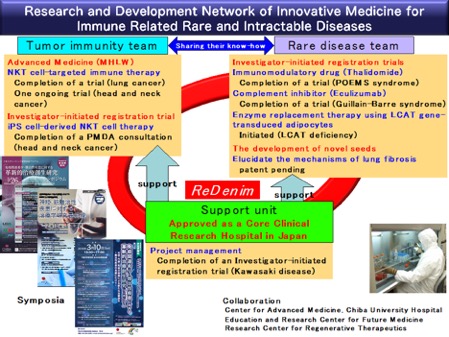MEDICINE FOR RARE DISEASES
INNOVATIVE APPROACH OFFERS HOPE FOR INTRACTABLE PROBLEMS
-The ReDenim network is developing therapies to treat rare and intractable diseases.
Research Keywords: Rare Disease, Intractable Cancer, iPS Cell

Scientists at Chiba University have a long track record of excellence in clinical research, particularly for investigations in patients with immune-related diseases. And Chiba University researchers have made a number of important breakthroughs in basic immunology and disease biology. However, connecting these two areas, a field known as translational research, has often been less successful.
That is a problem that Shinichiro Motohashi wants to fix. Motohashi leads Chiba’s Research and Development Network of Innovative Medicine for Immune Related Rare and Intractable Diseases — ReDenim. The network is aiming to provide the clinical support and resources needed to take discoveries from the lab to the clinic.
In particular, ReDenim has singled out two disease areas for which there are currently no good treatment options — deadly forms of cancer, such as head and neck tumors; and rare diseases that each afflict fewer than 50,000 people in Japan, but collectively affect about 10 percent of the population.
TWO-PRONGED APPROACH
Motohashi and Daiju Sakurai belong to the tumor immunity team, which intends to capitalize on Chiba University’s expertise in developing cellbased immunotherapies. Their approach uses tumor-destroying natural killer T-cells to search for combination therapies that can further modulate the tumor immune microenvironment in a favorable way. They also intend to identify biomarkers that can predict how individual patients will respond to these treatments.
Led by Sonoko Misawa, the rare-disease team, including Masayuki Kuroda and Katsunori Fujii, is using immune-modulating drugs and gene therapies to address immune-related peripheral nerve disease and hereditary disease. Kotaro Suzuki and Kiyoshi Hirahara are aiming to develop new treatments based on the analysis of pathological conditions using animal models of autoimmune diseases and tissue fibrosis. Koji Eto and his collaborators of orthopedics and plastic surgery, Seiji Ohtori, Sumihisa Orita, Yasuhiro Shiga, and Nobuyuki Mitsukawa, developed a new method of wound healing using platelet-rich plasma derived from iPS cells. Kuroda is also working with the oncology immunology team to develop transgenic adipocyte technology that can be applied to cancer treatments, in addition to his research target, hereditary metabolic diseases.
Importantly, both teams will share research experiences, technology platforms and manufacturing facilities. “Sharing the know-how to treat each disease within the network will accelerate drug development,” says Motohashi. And the two teams will also have access to support units at the university’s Core Clinical Research Hospital, a designation granted to Chiba University under Japan’s Medical Care Act in recognition of its ability to apply basic science toward therapeutic applications.
This support includes consultation services on issues such as intellectual property, project management, clinical trial design and other steps needed to fulfill the promise of translational medicine. “Our ultimate goal is to form a therapeutic cluster that can be applied to a wide variety of rare and intrac- table diseases,” Motohashi says. He can even foresee a day when the infrastructure created through ReDenim could be used to develop new therapies for common diseases, such as diabetes or lung cancer.
Judging by the progress they have made so far, Motohashi and his coworkers are well on their way to fulfilling their dream, and their potential is widely recognized. ReDenim has already forged collaborations with some of the world’s leading experts in cancer immunotherapy and rare diseases, and is working with Japanese drug companies to partner on additional research projects.
(CHIBA RESEARCH 2020)Members
Principal Investigator
| Name | Title, Affiliation | Research Themes |
|---|---|---|
| MOTOHASHI Shinichiro | Professor, Graduate School of Medicine | Tumor Immunology |
Co-Investigatior
| Name | Title, Affiliation | Research Themes |
|---|---|---|
| HANAOKA Hideki | Professor, Chiba University Hospital | Internal Medicine |
| ISHII Itsuko | Professor, Chiba University Hospital | Pharmacotherapeutics |
| KURODA Masayuki | Specially Appointed Associate Professor, Chiba University Hospital | Gene Therapy Science Microbiology |
| HIRAHARA Kiyoshi | Associate Professor, Graduate School of Medicine | Immunology, Pulmonary Medicine |
| MISAWA Sonoko | Associate Professor, Chiba University Hospital | Neurology |
| SUZUKI Kotaro | Associate Professor, Graduate School of Medicine | Collagen Disease Allergology |
| ETO Koji | Professor, Graduate School of Medicine | Stem Cell Biology,Hematology |
Research report(2016〜2018)
Elucidating the pathophysiology of intractable diseases has been progressing in detail at the molecular and gene levels, through which many therapeutic concepts have so far been presented, and translational research (TR) is now being conducted. Simple deduction from animal experimental data is still insufficient which makes it difficult to invent novel therapeutic strategies in human beings who are rich in diversity and marked by individual differences, and the “Proof of Concept” can only be obtained only by conducting clinical research. Therefore, in our research group with various seeds and experience in the development of new treatments for intractable or rare diseases related to immunity, exploratory TRs and validation clinical trials have been performed to verify new therapeutic concepts. In addition, we have established the Research and Development Network of Immune Related Rare and Intractable Diseases (ReDenim) which is applicable to various rare and intractable diseases (http: // redenim- chiba.jp/). The results that we have so far achieved up to the end of fiscal 2018 are shown below:
